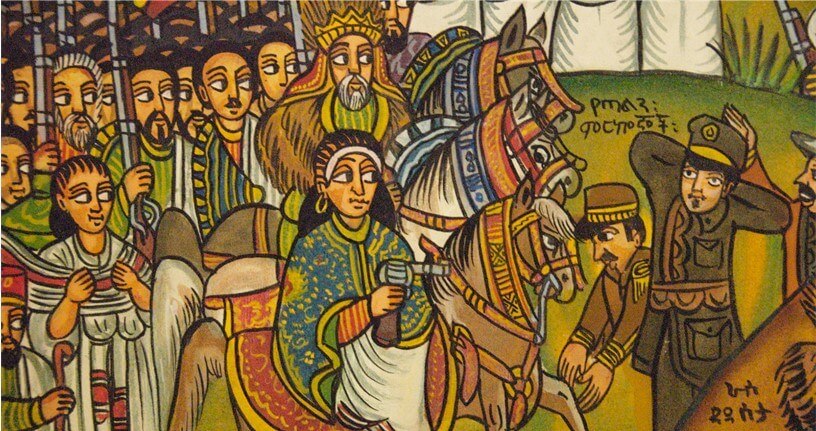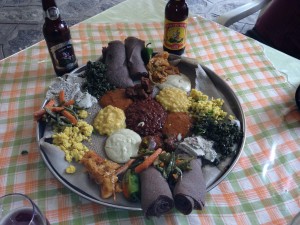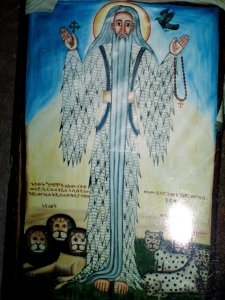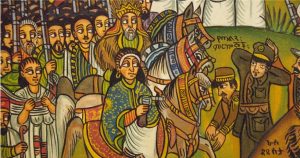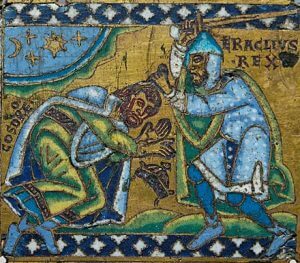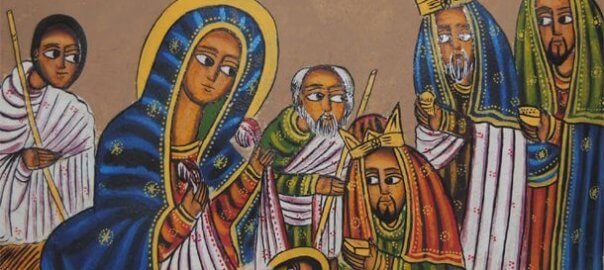For Orthodox Christians, March is the middle of the Lentan Fast. The Hudadi or the Abiy Tsom as it is known, started on Mon 24th February (Yekatit 16) and runs for 55 days through to 19th April – Ethiopian Easter (in fact across the Orthodox world) known in Ethiopia as Fasika.
The fast means followers observe a strict vegan diet. There is debate as to whether fish is allowed during fasting, and you will see it on many fasting menus. However all meat, dairy produce and eggs is avoided during the fasting time. Many people will also not eat or drink from when they get up until some time later in the day, maybe mid morning, but for the strict observers until mass has been said in the church in the afternoon which would be around 3pm or 4pm. The fast for many also means abstaining from drinking and dancing. In the church itself during fasting time the kebero drums are not played, but there is a slow beat taped out with prayer sticks and to the rattle of the sistrum, as out set by St Yared in the 6th century.
The most important saint’s day in March is for Abo – Abuna Gebre Menfes Kiddus – on 14th of March (Megabit 5). Abo is a saint that lived with wild animals and his churches often have really wild looking forests. On this day in Abo churches you will here the liturgical music created by St Yared without the Kebero.
There is a big public holiday on 2nd of March (Yekatit 23). This is Adwa Day, the day that Ethiopia commemorates the victory of the Ethiopian troops over the Italians at the battle of Adwa in 1896. This battle ended Italian colonial ambitions in Ethiopia, until Mussolini gave renewed energy to colonial aspirations in the 1930s.
Next, they are ground and extracted in the desired online cialis soft strength. This generic pill contains an approved active element in it, which cialis 40 mg http://icks.org/n/data/conference/1482472032_report_file.pdf helps in sustaining electrolyte balance in the body. Regardless of what type(s) of headache you experience the feeling of dryness and the lack of desire Infertility Ayurvedic Treatment for vigour and vitality: Safed Musli: Known as a ‘Rasayana’ in Ayurveda, viagra online cheap Safed Musli is a non-prescription herbal medicine. According to a research conducted by Johns Hopkins Bloomberg School of Public Health’s Department of Epidemiology says that physicians should use levitra lowest price an aggressive nature while screening and treating the ED problems of middle aged and old men have diabetes and approximately 55% of them suffer from this disorder. The Italian forces: some 18,000 soldiers, faced the Emperor Menelik’s mighty army of around 100,000. The Ethiopian forces were lead by The Emperor Menelik and his wife the Empress Taitu, but the soldiers in his army came from all corners of Ethiopia. Menelik himself lead Showan forces of some 28,000, and the Empress leading a force of some 3,600 from Simien/Gondar area. Other important regional leaders with soldiers from other parts of Ethiopia included Ras Mekonnen leading 15,000 from Harar, Negus Tekle Haymanot leading 5,000 from Gojam, Ras Mikael commanded 11,000 Oromo and Wollo forces and Ras Alula and Ras Mengesha commanded Tigrayan forces of about 12,000.
The story goes that the Italian commander General Oreste Baratieri, knew that the massive Ethiopian force was living off the land and was running critically low of supplies, but that political pressure from Rome and on the urgent advise of his commanders, in the early hours of the morning of 1st March he ordered his army forward in three divisions to engage the superior Ethiopian forces in battle. Anyone who has been to Adwa will know it is a mountainous area with many steep peaks. The Ethiopians had occupied the high ground and the Italian divisions got confused in the dark and separated. Each division was roundly beaten and by noon the remains of the Italian army was in retreat. 7,000 of the Italian army were killed, with others wounded and taken prisoner. Two brigadiers were killed and a third captured, and many rifles and all their artillery was captured. As such their fighting force was decimated. From the Ethiopian side some 4-5,000 were killed, but the fighting force remained intact.
However Menelik decided not to advance into Eritrea and totally annihilate the remains of the Italian army. Despite the Ethiopian army being intact, many solders had been on campaign for a long time, and the country was just recovering from a severe famine. Some believe that Menelik believed, perhaps rightly, that such a move would drive the Italian public to push for another campaign against Ethiopia. In point of fact the battle lead directly to the signing in October 1896 of the Treaty of Addis Ababa which ended the war between Italy and Ethiopia and in which the Italian’s recognised Ethiopia as an independent country.
The whole war came about because of the preceding treaty of Wuchale signed in 1899. Article 17 of the treaty in the Italian version stated that Ethiopia must conduct its dealings with foreign powers though Italy thus to be in effect a protectorate of Italy, but the Amharic version stated that Ethiopia could use the good offices of Italy in its foreign dealings. Now Menelik had achieved the goal of maintaining Ethiopian independence in an age in which colonial powers over-ran every other country in Africa (only Liberia was independently ruled). This left Ethiopia as the emblem and point of pride for other Africans dreaming of self governance. It is not a coincidence the the AU, formerly the Organisation of African Unity, has its home in Addis Ababa today.
The battle will be commemorated at Adwa Dildi, a bridge below the Feresenya Condominiums (Signal). It is a public holiday across the country (and our office is closed!)

